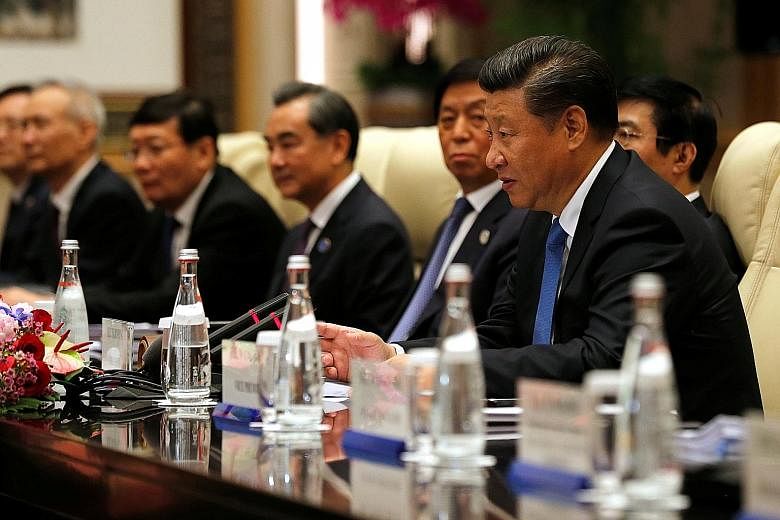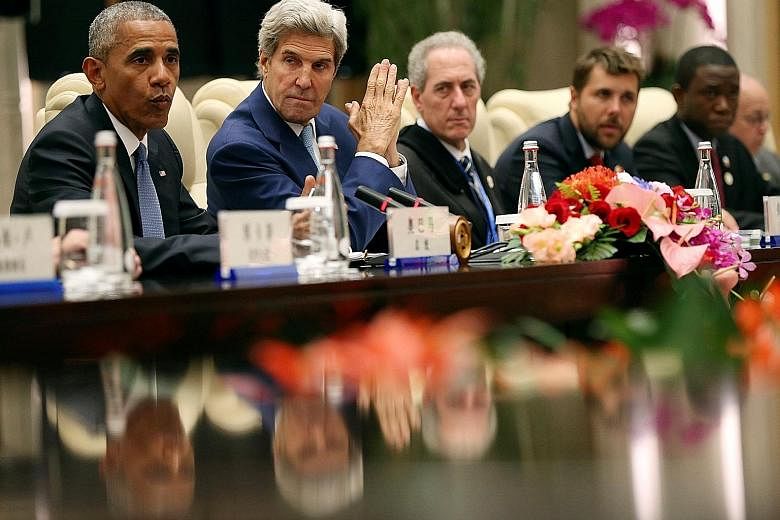China and the United States have formally ratified the Paris Agreement on cutting global warming emissions, showing that both can work together despite their differences on issues such as cyber and maritime security.
At a ceremony yesterday held ahead of the Group of 20 (G-20) summit, Chinese President Xi Jinping and US President Barack Obama handed ratification documents to United Nations chief Ban Ki Moon, marking their countries' formal entry into the pact.
"Despite our differences on other issues, we hope our willingness to work together on this issue will inspire further ambition and further action around the world," said Mr Obama.
Mr Xi was quoted in media reports as saying that their move "speaks to the shared ambition and resolve of China and the United States in addressing global issues".
Observers say ratification of the Paris Agreement by the world's two largest emitters could put pressure on others to follow suit and help see the accord take effect by this year.
-
PARIS CLIMATE PACT
-
*The historic deal aims to slash greenhouse gas emissions and cap global warming increases at well below 2 deg C and, if possible, at 1.5 deg C above pre-industrial levels.
*180 countries have signed the agreement.
*It will go into effect 30 days after 55 nations - covering at least 55 per cent of global emissions - formally ratify it.
Both leaders yesterday also held their eighth meeting since Mr Xi became president in 2013. It is likely their last before Mr Obama ends his eight-year term next January. Issues of differences such as freedom of navigation in the South China Sea and the US deployment of a missile defence system in South Korea reportedly topped the agenda.
"I know that we will have once again candid conversations about some of those differences: issues like human rights or cyber or maritime," Mr Obama said at the start of their meeting.
Mr Xi said China was willing to work with the US to "ensure bilateral ties stay on the right track", reported the Xinhua news agency.
He said China appreciated the cooperation and support of the US over the two-day G-20 summit, which opens today, adding that "holding a successful summit is the global community's shared expectation, as well as the due responsibility of China and the US as the world's two largest economies".
Reuters wire agency reported that the two leaders pledged to develop a tracking mechanism to improve bilateral law enforcement on cyber issues and resolved to strengthen coordination on the North Korean nuclear issue.
Reflecting the tension in their bilateral ties, arguments broke out on the airport tarmac during Mr Obama's welcome. Reuters reported that a Chinese security official blocked US National Security Adviser Susan Rice and spoke angrily to her before a Secret Service agent intervened.
The New York Times reported that "shouting matches also broke out" between White House staff and Chinese guards over the number of people allowed into the State House where the leaders met.
During the G-20 summit, Mr Xi is also expected to hold bilateral meetings with leaders from South Korea, Britain and, possibly, Japan.
Observers say China is keen to prevent bilateral disputes - like a stalled nuclear power plant deal with Britain - from overshadowing its role as a global agenda-setter at the G-20 summit.
"China will try to keep these disputes out of the spotlight, even though other countries may not compromise so easily," Sino-US expert Shi Yinhong of Renmin University told The Sunday Times.



